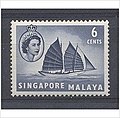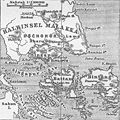Portal:Singapore
 Map of Singapore Singapore, officially the Republic of Singapore, is an island country and city-state in maritime Southeast Asia. The country's territory comprises one main island, 63 satellite islands and islets, and one outlying islet. It is about one degree of latitude (137 kilometres or 85 miles) north of the equator, off the southern tip of the Malay Peninsula, bordering the Strait of Malacca to the west, the Singapore Strait to the south along with the Riau Islands in Indonesia, the South China Sea to the east, and the Straits of Johor along with the State of Johor in Malaysia to the north.
Singapore's history dates back at least eight hundred years, having been a maritime emporium known as Temasek and subsequently a major constituent part of several successive thalassocratic empires. Its contemporary era began in 1819, when Stamford Raffles established Singapore as an entrepôt trading post of the British Empire. In 1867, Singapore came under the direct control of Britain as part of the Straits Settlements. During World War II, Singapore was occupied by Japan in 1942 and returned to British control as a separate Crown colony following Japan's surrender in 1945. Singapore gained self-governance in 1959 and, in 1963, became part of the new federation of Malaysia, alongside Malaya, North Borneo, and Sarawak. Ideological differences led to Singapore's expulsion from the federation two years later; Singapore became an independent sovereign country in 1965. After early years of turbulence and despite lacking natural resources and a hinterland, the nation rapidly developed to become one of the Four Asian Tigers. As a highly developed country, it has one of the highest GDP per capita (PPP) in the world. It is also identified as a tax haven. Singapore is the only country in Asia with a AAA sovereign credit rating from all major rating agencies. It is a major aviation, financial, and maritime shipping hub and has consistently been ranked as one of the most expensive cities to live in for expatriates and foreign workers. Singapore ranks highly in key social indicators: education, healthcare, quality of life, personal safety, infrastructure, and housing, with a home-ownership rate of 88 percent. Singaporeans enjoy one of the longest life expectancies, fastest Internet connection speeds, lowest infant mortality rates, and lowest levels of corruption in the world. It has the third highest population density of any country in the world, although there are numerous green and recreational spaces as a result of urban planning. With a multicultural population and in recognition of the cultural identities of the major ethnic groups within the nation, Singapore has four official languages: English, Malay, Mandarin, and Tamil. English is the common language, with exclusive use in numerous public services. Multi-racialism is enshrined in the constitution and continues to shape national policies in education, housing, and politics. Singapore is a parliamentary republic in the Westminster tradition of unicameral parliamentary government, and its legal system is based on common law. While the country is de jure a multi-party democracy with free elections, the government under the People's Action Party (PAP) wields widespread control and political dominance. The PAP has governed the country continuously since full internal self-government was achieved in 1959, and holds a supermajority in Parliament. One of the five founding members of ASEAN, Singapore is also the headquarters of the Asia-Pacific Economic Cooperation Secretariat, the Pacific Economic Cooperation Council Secretariat, and is the host city of many international conferences and events. Singapore is also a member of the United Nations, the World Trade Organization, the East Asia Summit, the Non-Aligned Movement, and the Commonwealth of Nations. (Full article...)Selected article -"Majulah Singapura" is the national anthem of Singapore. Composed by Zubir Said in 1958 as a theme song for official functions of the City Council of Singapore, the song was selected in 1959 as the nation's anthem when it attained self-government. Upon full independence in 1965, "Majulah Singapura" was formally adopted as Singapore's national anthem. By law, the anthem must be sung with Malay lyrics, but there are authorised translations of the lyrics of the anthem in Singapore's three other official languages: English, Mandarin and Tamil. The national anthem is regularly performed or sung in schools and armed forces camps at ceremonies held at the beginning and/or the end of each day, during which the national flag is also raised and lowered and the national pledge is taken. Singaporeans are especially encouraged to sing the national anthem on occasions of national celebration or national significance such as at the National Day Parade, at National Day observance ceremonies conducted by educational institutions and government departments and at sporting events at which Singapore teams are participating. (Full article...) Selected picture Biopolis, a research and development centre for biomedical sciences located at one-north in Buona Vista, Singapore. Read more... General imagesThe following are images from various Singapore-related articles on Wikipedia.
Selected biography -Walter Woon Cheong Ming SC (born 12 September 1956) is a Singaporean lawyer who served as the fifth attorney-general of Singapore between 2008 and 2010. He is currently an Emeritus Professor at the National University of Singapore Faculty of Law, Lee Kong Chian Visiting professor at the Singapore Management University Yong Pung How School of Law, and the dean of the RHT Legal Training Institute. A lawyer by profession, Woon specialises in company law and securities regulation. Having graduated from the National University of Singapore and St. John's College, Cambridge, Woon joined the teaching staff of the National University of Singapore Faculty of Law in 1981 and subsequently served as Sub-Dean and Vice-Dean. He was appointed Professor of Law in 1999. He had also served as the legal adviser to the president of Singapore and the Council of Presidential Advisers between 1995 and 1997. (Full article...) Did you know (auto-generated)
In this month
More did you know -
Selected panoramaThe National University of Singapore (Abbreviation: NUS; Chinese: 新加坡国立大学; pinyin: Xīnjiāpō Guólì Dàxué; Abbreviated 国大; Malay: Universiti Kebangsaan Singapura; Tamil: சிங்கப்பூர் தேசியப் பல்கலைக்கழகம் ) is Singapore's oldest university. It is the largest university in the country in terms of student enrollment and curriculum offered. Singapore topicsRelated portalsSoutheast Asia Other Countries Tasks
CategoriesWikiprojectsAssociated WikimediaThe following Wikimedia Foundation sister projects provide more on this subject:
Discover Wikipedia using portals |































































